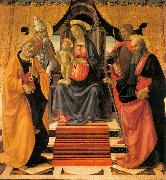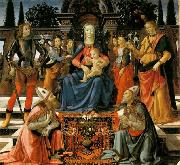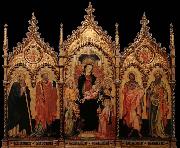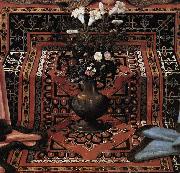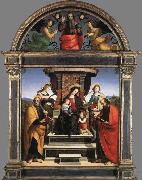
|
GHIRLANDAIO, Domenico
|
|||
|
|
|||
| Italian Early Renaissance Painter, 1449-1494 Florentine painter, whose family name was Bigordi. He may have studied painting and mosaics under Alesso Baldovinetti. Ghirlandaio was an excellent technician. Keenly observant of the contemporary scene, he depicted many prominent Florentine personalities within his religious narrative paintings. Among his earliest frescoes are the Madonna with the Vespucci Family and the Last Supper (Church of the Ognissanti, Florence). He painted scenes from the life of Santa Fina (collegiate church in San Gimigniano) and frescoes in the Palazzo Vecchio, Florence. In 1481, Pope Sixtus IV called him to Rome, along with Botticelli, to decorate the Sistine Chapel. He painted the Calling of the First Apostles, a scene close in spirit to Masaccio. He returned to Florence to work on the frescoes in the Sassetti Chapel in Santa Trinita. He introduced Sassetti, Corsi, Poliziano, the Medici, and many other contemporaries as participants in the life of St. Francis. Ghirlandaio's most famous achievement is his fresco cycle of the life of Mary and St. John the Baptist for the choir of Santa Maria Novella. Michelangelo served an apprenticeship with him at this time and probably worked on these frescoes. Other examples of his art are the Adoration of the Magi (Uffizi); another Adoration (Hospital of the Innocents); a mosaic of the Annunciation for the Cathedral; a portrait of Francesco Sassetti and his son (Metropolitan Mus.); | |||
|
|
|||
|
Madonna and Child Enthroned with Saints new4/GHIRLANDAIO, Domenico-522424.jpg Painting ID:: 32341 |
c. 1479 Tempera on wood, 170 x 160 cm | ||
|
|
|||
|
GHIRLANDAIO, Domenico
|
|||
|
|
|||
| Italian Early Renaissance Painter, 1449-1494 Florentine painter, whose family name was Bigordi. He may have studied painting and mosaics under Alesso Baldovinetti. Ghirlandaio was an excellent technician. Keenly observant of the contemporary scene, he depicted many prominent Florentine personalities within his religious narrative paintings. Among his earliest frescoes are the Madonna with the Vespucci Family and the Last Supper (Church of the Ognissanti, Florence). He painted scenes from the life of Santa Fina (collegiate church in San Gimigniano) and frescoes in the Palazzo Vecchio, Florence. In 1481, Pope Sixtus IV called him to Rome, along with Botticelli, to decorate the Sistine Chapel. He painted the Calling of the First Apostles, a scene close in spirit to Masaccio. He returned to Florence to work on the frescoes in the Sassetti Chapel in Santa Trinita. He introduced Sassetti, Corsi, Poliziano, the Medici, and many other contemporaries as participants in the life of St. Francis. Ghirlandaio's most famous achievement is his fresco cycle of the life of Mary and St. John the Baptist for the choir of Santa Maria Novella. Michelangelo served an apprenticeship with him at this time and probably worked on these frescoes. Other examples of his art are the Adoration of the Magi (Uffizi); another Adoration (Hospital of the Innocents); a mosaic of the Annunciation for the Cathedral; a portrait of Francesco Sassetti and his son (Metropolitan Mus.); | |||
|
|
|||
|
Madonna and Child Enthroned with Saints new16/GHIRLANDAIO, Domenico-799852.jpg Painting ID:: 43856 |
c. 1483 Tempera on wood, 191 x 200 cm | ||
|
|
|||
|
unknow artist
|
|||
|
|
|||
|
|
|||
|
Madonna and Child Enthroned with Saints new16/unknow artist-287345.jpg Painting ID:: 44447 |
1400-50 Tempera and gold on panel, 218 x 258 cm | ||
|
|
|||
|
GHIRLANDAIO, Domenico
|
|||
|
|
|||
| Italian Early Renaissance Painter, 1449-1494 Florentine painter, whose family name was Bigordi. He may have studied painting and mosaics under Alesso Baldovinetti. Ghirlandaio was an excellent technician. Keenly observant of the contemporary scene, he depicted many prominent Florentine personalities within his religious narrative paintings. Among his earliest frescoes are the Madonna with the Vespucci Family and the Last Supper (Church of the Ognissanti, Florence). He painted scenes from the life of Santa Fina (collegiate church in San Gimigniano) and frescoes in the Palazzo Vecchio, Florence. In 1481, Pope Sixtus IV called him to Rome, along with Botticelli, to decorate the Sistine Chapel. He painted the Calling of the First Apostles, a scene close in spirit to Masaccio. He returned to Florence to work on the frescoes in the Sassetti Chapel in Santa Trinita. He introduced Sassetti, Corsi, Poliziano, the Medici, and many other contemporaries as participants in the life of St. Francis. Ghirlandaio's most famous achievement is his fresco cycle of the life of Mary and St. John the Baptist for the choir of Santa Maria Novella. Michelangelo served an apprenticeship with him at this time and probably worked on these frescoes. Other examples of his art are the Adoration of the Magi (Uffizi); another Adoration (Hospital of the Innocents); a mosaic of the Annunciation for the Cathedral; a portrait of Francesco Sassetti and his son (Metropolitan Mus.); | |||
|
|
|||
|
Madonna and Child Enthroned with Saints new21/GHIRLANDAIO, Domenico-454895.jpg Painting ID:: 62995 |
1483 Tempera on wood Galleria degli Uffizi, Florence This detail of a flower vase on a colourful carpet could be taken from a Flemish panel painting if it were painted using the oil technique developed there rather than tempera, which Ghirlandaio used. In this detail, the artist creates a positive frenzy of colours and forms to enliven the picture. Artist: GHIRLANDAIO, Domenico Painting Title: Madonna and Child Enthroned with Saints (detail) , 1451-1500 Painting Style: Italian , , still-life | ||
|
|
|||
|
RAFFAELLO Sanzio
|
|||
|
|
|||
| Italian High Renaissance Painter, 1483-1520 Italian painter and architect. As a member of Perugino's workshop, he established his mastery by 17 and began receiving important commissions. In 1504 he moved to Florence, where he executed many of his famous Madonnas; his unity of composition and suppression of inessentials is evident in The Madonna of the Goldfinch (c. 1506). Though influenced by Leonardo da Vinci's chiaroscuro and sfumato, his figure types were his own creation, with round, gentle faces that reveal human sentiments raised to a sublime serenity. In 1508 he was summoned to Rome to decorate a suite of papal chambers in the Vatican. The frescoes in the Stanza della Segnatura are probably his greatest work; the most famous, The School of Athens (1510 C 11), is a complex and magnificently ordered allegory of secular knowledge showing Greek philosophers in an architectural setting. The Madonnas he painted in Rome show him turning away from his earlier work's serenity to emphasize movement and grandeur, partly under Michelangelo's High Renaissance influence. The Sistine Madonna (1513) shows the richness of colour and new boldness of compositional invention typical of his Roman period. He became the most important portraitist in Rome, designed 10 large tapestries to hang in the Sistine Chapel, designed a church and a chapel, assumed the direction of work on St. Peter's Basilica at the death of Donato Bramante, | |||
|
|
|||
|
Madonna and Child Enthroned with Saints new21/RAFFAELLO Sanzio-263256.jpg Painting ID:: 63816 |
Madonna and Child Enthroned with Saints 1504-05 Tempera and gold on wood, 172,4 x 172,4 cm (main panel) Metropolitan Museum of Art, New York This is the main panel and lunette from a relatively early work by Raphael, also known as the Colonna Altarpiece, painted for the convent of Sant'Antonio da Padova at Perugia. He began the work when he was barely 20 years old, just before he left for Florence in 1504, and he completed it the following year after he returned to Perugia. The influence of his teacher Perugino can be seen in the conservative composition. Nevertheless, Raphael has infused into the stiffly posed group a breadth and dignity that reflects his knowledge of the work of Fra Bartolommeo in Florence. Particularly beautiful is the way the figures fill the curved shape of the lunette. Flanking the Madonna and Child with the infant Saint John the Baptist are Saints Peter, Catherine, Cecilia(?), and Paul.Artist:RAFFAELLO Sanzio Title: Madonna and Child Enthroned with Saints Painted in 1501-1550 , Italian - - painting : religious | ||
|
|
|||
|
Also Buy::. For Following Paintings / Artists / Products, Please Use Our Search Online: |






